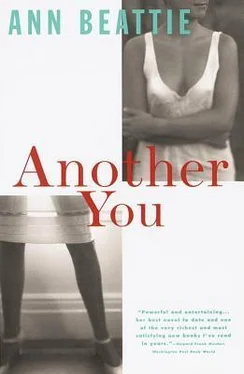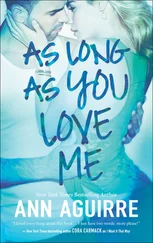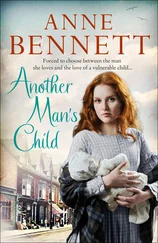Ann Beattie - Another You
Здесь есть возможность читать онлайн «Ann Beattie - Another You» весь текст электронной книги совершенно бесплатно (целиком полную версию без сокращений). В некоторых случаях можно слушать аудио, скачать через торрент в формате fb2 и присутствует краткое содержание. Год выпуска: 2014, Издательство: Vintage Books, Жанр: Современная проза, на английском языке. Описание произведения, (предисловие) а так же отзывы посетителей доступны на портале библиотеки ЛибКат.
- Название:Another You
- Автор:
- Издательство:Vintage Books
- Жанр:
- Год:2014
- ISBN:нет данных
- Рейтинг книги:5 / 5. Голосов: 1
-
Избранное:Добавить в избранное
- Отзывы:
-
Ваша оценка:
- 100
- 1
- 2
- 3
- 4
- 5
Another You: краткое содержание, описание и аннотация
Предлагаем к чтению аннотацию, описание, краткое содержание или предисловие (зависит от того, что написал сам автор книги «Another You»). Если вы не нашли необходимую информацию о книге — напишите в комментариях, мы постараемся отыскать её.
Another You — читать онлайн бесплатно полную книгу (весь текст) целиком
Ниже представлен текст книги, разбитый по страницам. Система сохранения места последней прочитанной страницы, позволяет с удобством читать онлайн бесплатно книгу «Another You», без необходимости каждый раз заново искать на чём Вы остановились. Поставьте закладку, и сможете в любой момент перейти на страницу, на которой закончили чтение.
Интервал:
Закладка:
“Fuck Tony,” he said, pounding the heel of his hand into the steering wheel.
“Fuck what?” McCallum said, opening his eyes and shifting in the seat. “Oh,” he said, answering his own question, “Tony the phony. Forget him. If she hadn’t already forgotten him, you wouldn’t have heard about it.”
“You think so?” He could hear the tenuous acceptance of the idea in his voice. Not exactly Gordon, saying, “Life — can you beat it?” but still, he was surprised to realize that he had sounded slightly hopeful.
“Absolutely,” McCallum said.
“You’re humoring me.”
“It’s what I believe. You’ve got to understand, I don’t exactly idealize the union of marriage right now, with these sutures still dissolving and pinpricks of pain burning my gut like bees stinging me.”
“How are you doing?” he asked McCallum — as if he hadn’t just heard.
“Used to be a husband,” McCallum said. “Used to like my color TV. Even had a pet. A turtle. Did I tell you some neighbor came in and found the turtle under the bed and donated His Highness to the third-grade class? Used to have la vie normale . Used to be a devoted daddy.”
He waited for McCallum to continue talking about his son. He did not. He rose slightly, wincing in pain, then held the seat belt that crossed over his chest near his breastbone with his left hand as he sat upright, trying to ease some sudden pain, while looking through the windshield, taking in the budding trees, a tractor bumping along, plowing a field, the sinking sun. If it had been his right hand touching his upper chest on the left side, McCallum might have been pledging allegiance to those things. Pledging allegiance to daily life in Virginia, where the landscape, once they passed Warrenton, had begun to remind Marshall of New Hampshire. New Hampshire seemed far behind, farther than it was in actual miles, and he had to squint to bring back details of the roads he drove most days, narrowing his eyes to focus sharply on the remembered image of the ghostly dead elms crowding the road at the bend by Rimmer’s Stream, to envision the swaying light blinking yellow at the crossroads. The season hadn’t changed to almost-spring there; it was still winter, the light fading fast as evening came on, black ice a sheen that could surprise you on the roads.
To his right he saw a gun shop and shooting range that advertised discounts on fireworks. So many cars and trucks began to signal their turn into the parking lot that Marshall pulled into the left lane and slowed slightly to look, the way someone would decelerate to look at an accident: trucks were clustered in the lot, appearing as small as toys below the huge brown bear that loomed outside the store, its mouth opened in a red-tongued roar, its teeth the size of Roman candles. Beside the bear, he saw briefly as he glanced past McCallum, was a ride of some sort: a twirling disk with handles gripped by children, further dwarfed in the adult world by a thirty-foot bear. He thought again of McCallum’s son — whether seeing children brought him to McCallum’s mind, or whether, as it seemed, he’d written the boy off. Unless he asked, there would be no answer to that question, he could tell. He rolled up his window against the evening coolness, continued surveying the land. He thought that what he and Sonja might need was a change of scene, that they might explore the possibility of living elsewhere, someplace less harsh than New Hampshire, a place where spring came earlier. Though the problem didn’t have to do with long winters, but with her infatuation with Tony. Which she said had ended.
“If you pass another one of those places, we should get some fireworks, set them off in a field. Celebrate my being alive,” McCallum said.
“Do you think about your son?” he blurted out.
A moment’s delay before McCallum spoke. “Probably as much as you think about your wife.”
“I can’t stop thinking about her. The situation, really. Not her in particular.”
“Maybe that’s the problem,” McCallum said. “Maybe you’ve seen her as part of a situation, but you haven’t seen her in her own right. Good armchair-shrink speculation, don’t you think?”
“It might be true,” Marshall said.
“Might be, but what do I know?” He looked at Marshall. “How come you used to get so mad when I said you were my friend, now all of a sudden it’s just an accepted fact?”
“You persuaded me,” Marshall said. “With your many virtues.”
“Being?” McCallum said. “That the suggestion we hit the road came along at just the right time? Think things over yourself; see your brother; check out your sweetie.”
“You’ve got to be kidding.”
“You told me how guilty you feel about her dropping out of school. Come on — all I said was that you were sweet on her.”
“Only in your mind.”
“Not true, but I won’t argue because backing down is another one of my many virtues.”
“Your wife thought you were pretty domineering,” Marshall said.
McCallum shrugged. “What’s this?” he said. “You playing nyaa-nyaa-nyaa all of a sudden? For a while, she liked the way I was,” he said. “Only thing I went too far with was keeping after her about getting the kid on some medicine, which she construed as my wanting to shoot tranquillizer darts in him like he was a charging rhino — and of course I hoped she’d abort the next one.”
“I can’t believe my bad timing, to call just when …”
“Bad timing, good timing, I don’t know,” McCallum said. “I sort of like the idea of her in jail. Excuse me: in the prison psychiatric ward.”
“I still don’t see how a person would do something like that as a response to another person’s sarcasm.”
“She didn’t like criticism. All you can do with people like that is back off from them or keep your self-respect by saying whatever you want to say, whether you cross them or not.”
“But you didn’t suspect? Nothing made you suspect she might be violent?”
“What are you asking? Did I see her eating Twinkies?”
“What?”
“Twinkies. The Twinkies defense. Some lawyer went into court and—”
“Oh yeah,” Marshall said.
Stores began to string together into larger rows to become shopping areas, the farmland disappearing, new roads poked into recently graded land. They were the warm-up act for the inevitable Wal-Mart that was sure to appear momentarily, the blunt-topped Taj Mahal rising out of the suburban blight, the long reflecting pool in front sensibly paved to provide convenient parking for thousands of cars. A palace that was not a monument to love, but to discounts. Sonja snuck off to Wal-Mart once or twice a year, he knew: not so much to save money as to take in the spectacle, bring back some souvenirs, though she stuffed the bags deep in the garbage so he wouldn’t find them. All the problematic things we do that we don’t care to discuss: where we shop; with whom we have an affair. Insult to injury: it had been Tony, an uninteresting control freak who could drop his pants and play tag with someone’s wife, but heaven help the person who was improper enough to stay too long at his house, his precious, private house. He’d invited them, then flipped out. Sonja had told him about it: that childish proprietariness not acceptable to her … though hell: she hadn’t objected to joining in to help enact his childish fantasies. And wait a minute: if everyone else was expected to be so proper, what about showing up at Evie’s funeral, making Sonja uncomfortable, returning to the house, sipping coffee and making small talk, being nice to old ladies who would have fainted if they’d known what he spent his days doing with Sonja, suggesting all along he was Marshall’s friend as much as hers. How long would it take for him to be in Sonja’s presence and not think of Tony? When Tony picked out their house — he had, really, and Sonja had either loved it or pretended to love it — that early on, he now thought, Tony must have been conspiring to have an affair with Sonja.
Читать дальшеИнтервал:
Закладка:
Похожие книги на «Another You»
Представляем Вашему вниманию похожие книги на «Another You» списком для выбора. Мы отобрали схожую по названию и смыслу литературу в надежде предоставить читателям больше вариантов отыскать новые, интересные, ещё непрочитанные произведения.
Обсуждение, отзывы о книге «Another You» и просто собственные мнения читателей. Оставьте ваши комментарии, напишите, что Вы думаете о произведении, его смысле или главных героях. Укажите что конкретно понравилось, а что нет, и почему Вы так считаете.












